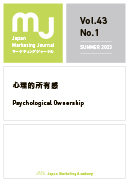Volume 43, Issue 1
Psychological Ownership
Displaying 1-14 of 14 articles from this issue
- |<
- <
- 1
- >
- >|
From the Editor-in-Chief
-
2023 Volume 43 Issue 1 Pages 3
Published: June 30, 2023
Released on J-STAGE: June 30, 2023
Download PDF (186K) Full view HTML
Preface
-
2023 Volume 43 Issue 1 Pages 4-6
Published: June 30, 2023
Released on J-STAGE: June 30, 2023
Download PDF (459K) Full view HTML
Special Issue / Invited Peer-Reviewed Article
-
2023 Volume 43 Issue 1 Pages 7-17
Published: June 30, 2023
Released on J-STAGE: June 30, 2023
Download PDF (549K) Full view HTML -
2023 Volume 43 Issue 1 Pages 18-28
Published: June 30, 2023
Released on J-STAGE: June 30, 2023
Download PDF (924K) Full view HTML -
2023 Volume 43 Issue 1 Pages 29-41
Published: June 30, 2023
Released on J-STAGE: June 30, 2023
Download PDF (556K) Full view HTML -
2023 Volume 43 Issue 1 Pages 42-52
Published: June 30, 2023
Released on J-STAGE: June 30, 2023
Download PDF (805K) Full view HTML -
2023 Volume 43 Issue 1 Pages 53-65
Published: June 30, 2023
Released on J-STAGE: June 30, 2023
Download PDF (865K) Full view HTML
Review Article / Invited Peer-Reviewed Article
-
2023 Volume 43 Issue 1 Pages 66-74
Published: June 30, 2023
Released on J-STAGE: June 30, 2023
Download PDF (542K) Full view HTML -
2023 Volume 43 Issue 1 Pages 75-82
Published: June 30, 2023
Released on J-STAGE: June 30, 2023
Download PDF (493K) Full view HTML
Marketing Case
-
2023 Volume 43 Issue 1 Pages 83-91
Published: June 30, 2023
Released on J-STAGE: June 30, 2023
Download PDF (3084K) Full view HTML
Book Review
-
2023 Volume 43 Issue 1 Pages 92-94
Published: June 30, 2023
Released on J-STAGE: June 30, 2023
Download PDF (342K) Full view HTML -
2023 Volume 43 Issue 1 Pages 95-97
Published: June 30, 2023
Released on J-STAGE: June 30, 2023
Download PDF (342K) Full view HTML
Annual Report
-
2023 Volume 43 Issue 1 Pages 98-99
Published: June 30, 2023
Released on J-STAGE: June 30, 2023
Download PDF (275K) Full view HTML
Editorial Note
-
2023 Volume 43 Issue 1 Pages 100
Published: June 30, 2023
Released on J-STAGE: June 30, 2023
Download PDF (578K) Full view HTML
- |<
- <
- 1
- >
- >|
